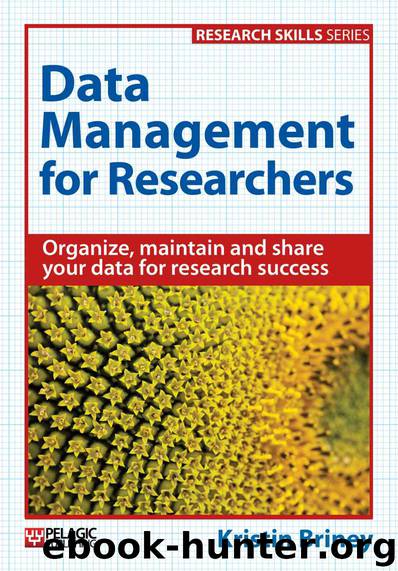Data Management For Researchers by Briney Kristin

Author:Briney, Kristin
Language: eng
Format: epub
Publisher: Pelagic Publishing
Published: 2015-08-31T16:00:00+00:00
7.2.4 Destroying data
Data security requires proper storage habits from the beginning to the end of the life of a dataset which, in practice, means destroying data after it is no longer needed. Only by destroying data can you ensure that it is not at risk for loss after that point. Additionally, destroying data means that you no longer need to devote resources to maintaining a secure storage environment for that data. It is best practice to destroy sensitive data after it is no longer needed or required to be retained.
Destroying sensitive data requires more work than simply deleting the file from your computer. When you delete a digital file from your computer, the file stays on your hard drive and only the reference to the file is removed. This is why it is often possible to recover data from a hard drive after a crash; the files are not truly destroyed even if the operating system does not recognize that they are still there. To truly delete something from a hard drive requires a specialized type of software; consult with your local technical support to see what data deletion software or support is available to you.
While hard drives can achieve true deletion via software, other types of media require different methods for data destruction (Corti 2014). The mechanics of storage on flash media, such as thumb drives, entail destroying the entire device to truly destroy data. It is also difficult to achieve true deletion on solid state devices (Johnston 2011; Wei et al. 2011), so ask for help if you need to destroy data on this type of media. Like flash media, CDs and DVDs must be physically destroyed, with breaking or shredding being a good option for this. It is a good idea to consult with your local information technology specialists for resources and assistance with destroying any of these types of media.
It is much easier to delete datasets on paper, as destroying the paper destroys the dataset. The most common way to destroy paper-based information is shredding. For extra-secure destruction, paper can be cross-cut into small pieces of confetti. Don’t forget to destroy consent forms, surveys, and other paper-based sensitive information, as needed, in addition to sensitive data.
Finally, note that there is software for finding sensitive data, such as social security numbers and bank account numbers, on your computer. This is especially useful for making sure that data has not spread to unrestricted areas and to gather up all sensitive data for destruction. If you think you have a problem with data spreading to uncontrolled locations, look into “PII scanning software” (personally identifiable information scanning software) such as Identity Finder or OpenDLP.
7.2.5 Personnel
Researchers with access to sensitive data add another vector of security risk. As they have access, it is much easier for them to accidentally or purposefully alter data. For example, Jatinder Ahluwalia, mentioned earlier in this chapter, not only fabricated his own data but also sabotaged colleagues’ experiments so that they unknowingly published false data (Oransky 2010).
Download
This site does not store any files on its server. We only index and link to content provided by other sites. Please contact the content providers to delete copyright contents if any and email us, we'll remove relevant links or contents immediately.
| Anthropology | Archaeology |
| Philosophy | Politics & Government |
| Social Sciences | Sociology |
| Women's Studies |
Cecilia; Or, Memoirs of an Heiress — Volume 1 by Fanny Burney(32544)
Cecilia; Or, Memoirs of an Heiress — Volume 2 by Fanny Burney(31940)
Cecilia; Or, Memoirs of an Heiress — Volume 3 by Fanny Burney(31928)
The Great Music City by Andrea Baker(31915)
We're Going to Need More Wine by Gabrielle Union(19033)
All the Missing Girls by Megan Miranda(15941)
Pimp by Iceberg Slim(14481)
Bombshells: Glamour Girls of a Lifetime by Sullivan Steve(14050)
For the Love of Europe by Rick Steves(13890)
Talking to Strangers by Malcolm Gladwell(13344)
Norse Mythology by Gaiman Neil(13343)
Fifty Shades Freed by E L James(13231)
Mindhunter: Inside the FBI's Elite Serial Crime Unit by John E. Douglas & Mark Olshaker(9315)
Crazy Rich Asians by Kevin Kwan(9274)
The Lost Art of Listening by Michael P. Nichols(7488)
Enlightenment Now: The Case for Reason, Science, Humanism, and Progress by Steven Pinker(7306)
The Four Agreements by Don Miguel Ruiz(6744)
Bad Blood by John Carreyrou(6610)
Weapons of Math Destruction by Cathy O'Neil(6263)
